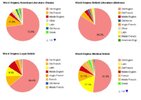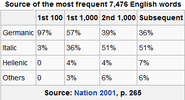Just out of curiosity, what percentage of the English language is made up of words that come from French and German? I was wondering because the English language became influenced by the French language during the Norman Conquest. Moreover, English is one of the Germanic languages.
When a foreign word enters the English language, is that word supposed to retain its original pronunciation or is it supposed to change? The way that the Japanese drink "sake" is pronounced in English is not the way that Japanese speakers would say it. The way that the word "croissant" is pronounced by a lot of English speakers is not the way that French speakers would pronounce it.
When a foreign word enters the English language, is that word supposed to retain its original pronunciation or is it supposed to change? The way that the Japanese drink "sake" is pronounced in English is not the way that Japanese speakers would say it. The way that the word "croissant" is pronounced by a lot of English speakers is not the way that French speakers would pronounce it.




